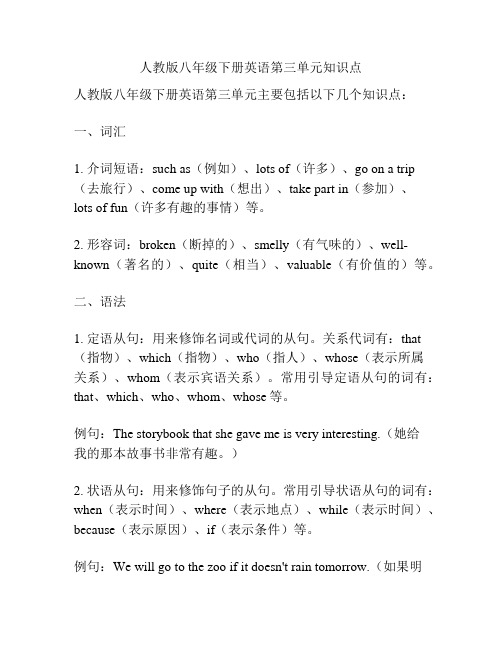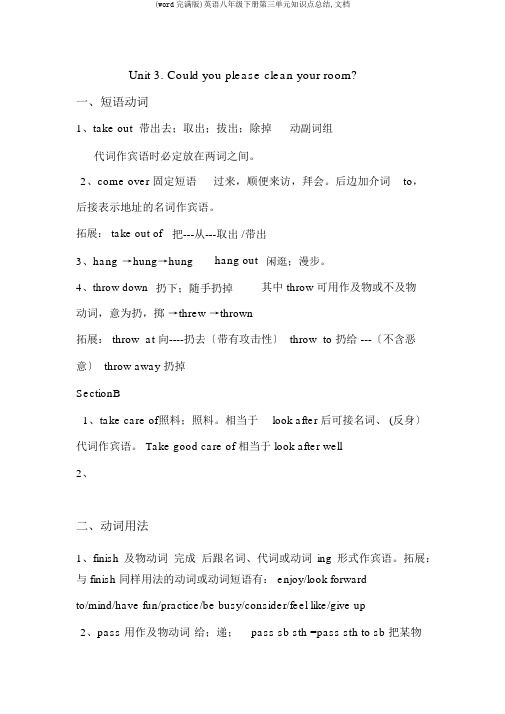八年级英语下册第三单元知识点
人教版八年级下册英语第三单元知识点

人教版八年级下册英语第三单元知识点人教版八年级下册英语第三单元主要包括以下几个知识点:一、词汇1. 介词短语:such as(例如)、lots of(许多)、go on a trip (去旅行)、come up with(想出)、take part in(参加)、lots of fun(许多有趣的事情)等。
2. 形容词:broken(断掉的)、smelly(有气味的)、well-known(著名的)、quite(相当)、valuable(有价值的)等。
二、语法1. 定语从句:用来修饰名词或代词的从句。
关系代词有:that (指物)、which(指物)、who(指人)、whose(表示所属关系)、whom(表示宾语关系)。
常用引导定语从句的词有:that、which、who、whom、whose等。
例句:The storybook that she gave me is very interesting.(她给我的那本故事书非常有趣。
)2. 状语从句:用来修饰句子的从句。
常用引导状语从句的词有:when(表示时间)、where(表示地点)、while(表示时间)、because(表示原因)、if(表示条件)等。
例句:We will go to the zoo if it doesn't rain tomorrow.(如果明天不下雨,我们会去动物园。
)3. 强调句型:强调句型是通过使用强调副词或者借助强调式动词来强调某一部分内容。
例句:It was Alice who won the first prize in the speech contest.(是爱丽丝在演讲比赛中获得了第一名。
)三、阅读技巧1. 根据上下文推测词义:通过上下文的提示来推测生词的词义。
2. 找出关键句:在一篇文章中,找出关键句可以帮助我们更好地理解文章的主旨。
3. 圈点标记:在阅读过程中进行圈点标记,可以帮助我们更好地理解文章,并且方便日后复习。
(word完整版)英语八年级下册第三单元知识点总结,文档

Unit 3. Could you please clean your room?一、短语动词1、take out 带出去;取出;拔出;除掉动副词组代词作宾语时必定放在两词之间。
2、come over 固定短语过来,顺便来访,拜会。
后边加介词to,后接表示地址的名词作宾语。
拓展: take out of把---从---取出 /带出3、hang→hung→hung hang out闲逛;漫步。
4、throw down扔下;随手扔掉其中 throw 可用作及物或不及物动词,意为扔,掷→threw →thrown拓展: throw at 向----扔去〔带有攻击性〕 throw to 扔给 ---〔不含恶意〕 throw away 扔掉SectionB1、take care of照料;照料。
相当于look after 后可接名词、 (反身〕代词作宾语。
Take good care of 相当于 look after well2、二、动词用法1、finish 及物动词完成后跟名词、代词或动词ing 形式作宾语。
拓展:与 finish 同样用法的动词或动词短语有: enjoy/look forwardto/mind/have fun/practice/be busy/consider/feel like/give up2、pass 用作及物动词给;递;pass sb sth =pass sth to sb 把某物递给某人。
走过、经过〔考试等〕作不及物动词,〔时间〕过去,流逝3、borrow sth from sb向某人借某物。
非连续性动词Lend(lent;lent) sb sth=lend sth to sb借给某人某物。
非连续性动词Keep 由“保存〞引申为“借〞,连续性动词,可与时间段连用。
四川 -----Excuse me,can I_____your pen?-----sorry,I have_____it to Bob.A.borrow;lendB.borrow;borrowedC.lend;borrowedD.lend;lent4、hate 及物动词厌恶;讨厌,表示一种感情或心理状态,不能够用于进行时态。
八年级英语下册第三单元笔记

八年级英语下册第三单元笔记一、重点单词。
1. rubbish.- n. 垃圾;废弃物。
例如:There is a lot of rubbish on the street.(街道上有很多垃圾。
)2. fold.- v. 折叠;对折。
如:Fold the paper in half.(把纸对折。
)3. sweep.- v. (swept, swept) 扫;打扫。
例如:I sweep the floor every day.(我每天扫地。
)4. floor.- n. 地板;地面。
如:The book is on the floor.(书在地板上。
)5. mess.- n. 杂乱;不整洁。
例如:What a mess!(多么杂乱啊!)6. throw.- v. (threw, thrown) 扔;掷。
例如:Don't throw rubbish everywhere.(不要到处扔垃圾。
)7. neither.- adv. 也不。
用于否定句中,表示前面所说的情况也适用于后者。
例如:He doesn't like apples, neither do I.(他不喜欢苹果,我也不喜欢。
)- pron. 两者都不。
例如:Neither of them is right.(他们两个都不对。
)8. shirt.- n. 衬衫。
如:This is a white shirt.(这是一件白色的衬衫。
)9. pass.- v. 给;递;走过;通过。
例如:Pass me the salt, please.(请递给我盐。
);He passed the exam.(他通过了考试。
)10. borrow.- v. 借;借用。
例如:Can I borrow your pen?(我能借用你的钢笔吗?)11. lend.- v. (lent, lent) 借给;借出。
例如:I can lend you some money.(我可以借给你一些钱。
八年级下册第三单元英语知识总结

八年级下册第三单元英语知识总结包括以下内容:
1. 单词和短语:包括各种与职业、爱好、活动等相关的单词和短语,如artist、painter、writer等职业词汇,以及paint、write、dance等动词短语。
2. 语法知识:包括现在完成时态和情态动词的使用。
现在完成时态表示过去发生的动作对现在造成的影响或结果,常用的助动词有have/has,常用的时间副词有already、yet、ever、never、before等。
情态动词表示推测或可能性,常用的有must、can、may、might等。
3. 阅读理解:本单元的阅读材料介绍了一些名人的职业和成就,通过阅读可以了解不同职业的特点和要求,同时提高阅读理解能力。
4. 写作技能:本单元的写作任务是写一篇题为“My Dream Job”的短文,介绍自己的职业理想和为实现这个理想所做的努力。
通过写作可以锻炼学生的语言组织能力和表达能力。
5. 听力技能:本单元的听力材料是关于各种职业的对话,通过听力可以了解不同职业的工作内容和要求,同时提高听力理解能力。
6. 口语技能:本单元的口语任务是进行一次模拟面试,通过角色扮演的方式让学生了解面试的流程和技巧,同时锻炼学生的口语表达能力和沟通技巧。
总结:本单元的英语知识涵盖了单词、语法、阅读、写作、听力和口语等方面,通过学习可以帮助学生掌握必要的语言知识和技能,提高英语水平和综合运用能力。
八年级英语下册第三单元知识点

八年级英语(Yu)下册第三单元知识点一(Yi)、重点短(Duan)语1.go out for dinner2.stay out late3.go to the movies4.get a ride5.work on sth.6.finish doing sth.7.clean and tidy8.do the dishes9.take out the rubbish10.fold your/the clothes11.sweep the floor12.make your/the bed13.clean the living room14.No problem15.16.17.throw down18.throw away19.(to+地(Di)点)20.take sb. for a walk21.all the time22.all day/evening23.do housework24.shout back 大声(Sheng)回应25.walk away26.share the housework27.28.(do sth.) in surprise 惊讶(Ya)地(做(Zuo)…)29.get something to drink30.watch one show31.hang out32.pass sb. sth.33.lend sb. sth.34.get sth. wet35.hate + (to do/ doing) sth.36.do chores37.help sb.(to)do /with sth38.bring a tent39.buy some snacks40.go to the store41.invite sb. to a party42.make sb. do sth.43.enough stress44.waste of time45.in order to为(Wei)了46.get good grades47.mind doing sth.48.depend on49.develop children 's independence50.look after/take care of51.do one’ s part in (doing ) sth.做某人分(Fen)内的事二(Er)、重点句(Ju)型1. Could you please clean your room? ( Could you please + do sth.?)2. I have to do some work.(Could +主(Zhu)语+ do sth. ?表(Biao)情求)4. She won’ t be happy if she sees t his mess.5. For one week, she did not do any housework and neither did I. (Neither +be动(Dong)词/助动(Dong)词/情态动词+主语.)6. My mom came over as soon as I sat down in front of the TV.7. It’s the parents’ job.(it为形式主语,to do不定式是真正的主语,并且后置)8. I think it’s important for children to learn how to do chores and help their parents with housework.9. The earlier kids learn to be independent, the better it is for their future. (the+比较级…,the+比较级…句型)三、单元考点2.take out带出去;取出,拿出 take the rubbish out take out 100yuan take your tickets out3. make the/ one’s bed整理床铺,make the table收拾桌子,摆放碗筷5. (at) any minute (now)很快,马上Mother will be back any minute now.Hurry up! The train is leaving at any minute.6. mess 【名词】不整洁,杂乱(不堪) be in a mess乱七八糟,杂乱不堪0. reply回答,回复【不及物动词】reply to sb./sth. ,reply to your letter reply in writing13. pass sb. sth.= pass sth. to sb.把某物递给/传给某人,请把盐递给我。
八下英语第三单元知识梳理

八下英语第三单元知识梳理一、单元核心知识点概述八下英语第三单元主要以日常交流为主题,涉及日常生活中的一些场景,如学校、家庭、购物等。
本单元的重点内容包括日常用语、词汇、短语和语法结构等。
通过本单元的学习,学生将能够更好地应对日常生活中的英语交流,提高口语表达能力。
二、重点词汇与短语1.新词汇:例如,recognize(认出),conversation(对话),pronunciation(发音)等。
2.实用短语:如,What"s the matter?(什么事?),How do you spell it?(怎么拼写?),Could you repeat that please?(请再说一遍?)等。
三、语法解析本单元的语法重点是现在进行时和一般现在时的用法。
现在进行时用于表示现在正在进行的动作,如:I"m listening to music.(我正在听音乐。
)一般现在时用于描述经常发生的动作或事实,如:She studies English everyday.(她每天都学习英语。
)四、实用对话与句型1.对话:例如,A: What"s your favorite color? B: My favorite color is blue.2.句型:如,How do you spell "champion"?(“冠军”怎么拼写?),I have a headache.(我头疼。
)五、练习与测试建议1.针对词汇和短语,可以通过制作单词卡片、和朋友一起练习口语等方式进行巩固。
2.对于语法知识,可以通过编写句子、翻译句子等方式进行练习。
3.本单元的实用对话和句型可以在日常生活中尝试使用,提高自己的英语实际应用能力。
总之,八下英语第三单元的学习重点在于日常英语交流能力的提升。
通过掌握本单元的核心知识点,学生们将能够在日常生活和学习中更加自信地运用英语。
英语八年级下册unit3知识点

英语八年级下册unit3知识点英语八年级下册Unit3主要是涉及到旅游及热门景点相关内容。
在这一单元中,我们学习了许多关于出行的单词和词组,同时也学习了旅游方面的文化知识。
下面,本文将围绕这些知识点,总结归纳出本单元的核心知识点。
第一部分:旅游方面的单词和词组1. sightseeing:观光2. destination:目的地3. travel,journey:旅行4. tour:游览5. accommodation:住宿6. transportation:交通7. ticket:票8. guide:导游9. excursion:短途旅游我们应该注意这些单词的正确发音和用法,使自己的英语更加准确清晰。
第二部分:旅游方面的文化知识1. 美食文化:在旅游中品尝当地的美食也是很重要的一部分。
比如在中国,烤鸭和火锅就是很受外国人欢迎的美食。
在日本,则是寿司和生鱼片。
2. 交通文化:在不同国家,交通方式也是各不相同的。
比如在欧洲,大多数人选择步行或骑行,而在中国城市,公共交通比较发达,人们通常乘坐地铁、公交车等。
3. 饮食礼仪:在不同国家,饮食礼仪也是有所不同的。
比如在中国,用餐时要招待客人,避免用筷子顶餐盘等等礼仪问题。
在日本,则更注重吃饭时的细节和仪式感。
第三部分:热门景点在这个单元中我们还学习了关于热门景点的话题。
下面介绍一些世界著名热门景点。
1. 埃菲尔铁塔:法国巴黎的标志性建筑。
2. 自由女神像:位于美国纽约港口,是法国人向美国人赠送的礼物。
3. 金门大桥:连接美国旧金山和马林县,是世界上最著名的桥梁之一。
4. 罗马斗兽场:意大利罗马的古代竞技场,是世界历史上最著名的文化遗产之一。
5. 万里长城:中国的镇国之宝,是目前世界上保存最完好、规模最宏大的古代筑墙工程。
总结:英语八年级下册Unit3,主要涉及旅游方面的单词和词组、旅游方面的文化知识和世界著名热门景点。
我们可以通过学习这些知识点,提高我们的英语交流能力,也可以更好地了解和欣赏不同国家的风土人情。
人教版八年级下册英语第三单元知识点

人教版八年级下册英语第三单元知识点Unit 3 Could you please clean your room?一、重点短语1.go out for dinner出去吃饭2.stay out late在外面待到很晚3.go to the movies去看电影4.geta ride搭车5.work on从事6.cleanand tidy干净洁7.do the dishes洗餐具8.takeout the rubbish倒垃圾9.fold your/the clothes叠衣服10.sweepthe floor扫地11.make your/the bed整理床铺12.cleanthe living room打扫客厅13.no problem没问题14.welcomesb.欢迎某人e home fro m school/work放学/下班回家16.throw down扔下17.sit down坐下eover过来19.take sb.for a walk带某人去散步20.all the time总是21.all day/evening整日/夜22.dohousework做家务23.shout back大声回应24.walkaway走开25.a comfortable home一个舒适的家26.share the housework分担家务27.get some thing to drink拿点喝的东西28.insurprise惊讶地29.watch one show观看节目30.hangout闲逛31.pass sb.sth.把某物传给某人32.lend sb.sth.把某物借给某人33.get sth.wet使某物弄湿34.hate to do sth.讨厌做某事35.help sb.to do/with sth帮助某人干某事36.do chores做杂务37.bring a tent带顶帐篷来38.buy some snacks买些小吃39.invite sb to a party邀请某人参加聚会40.go to the store去商店41.make sb.do sth使某人做某事42.enough stress足够的压力43.a waste of time浪费时间44.inorder to为了45.get goodgrades取得好成绩46.minddoing sth.介意做某事47.developchildren’s independence发展孩子的独立性48.dependon依赖49.do ones part in(doing)sth.做某人分内的事50.look after/take care of 照顾;51.finish doing sth.完成做某事二、知识点解析1.“Could you please do sth.?”的答语以下两种情况:接受请求时可以用Yes,sure./Sure./Of course./Certainly./No problem./My pleasure./It’s my pleasure./With pleasure.等来回答拒绝请求时可以用Sorry./Sorry,I can’t.等来回答,还可以用Ihave to do sth.来解释其否定句是:“Could youplease not do sth.?”2.有关“家务劳动”有关的短语:takeout the rubbish/trash倒垃圾foldone’s clothes叠衣服sweepthe floor扫地cleanthe room打扫房间makeone’s/the bed铺床dothe dishes/wash the dishes洗餐具3.throw down扔下throwat扔向,掷向throw away扔掉例题:Recycling is good,so don’t__________bottles or newspapers.A.find outB.hand ine upD.throw away4.the minute表示“一…….就……”,相当于as soon as.(引导时间状语从句)e.g.:I’ll tell himthe minute he gets there.5.常见time的短语:all the time一直,总是at times不时,有时in time及时on time按时forthe first time第一次in no time立刻at any time随时bythe time到...的时候atthe same同时have a good/great/wonderful time玩的愉快例题:---Hurry up.It’s almost time for school.---Don’t worry.We are sure to be atschool__________.A.at timesB.on timeC.all the timeD.by the time6.as….as表示“和……一样”,之间要用形容词或副词的原级。
- 1、下载文档前请自行甄别文档内容的完整性,平台不提供额外的编辑、内容补充、找答案等附加服务。
- 2、"仅部分预览"的文档,不可在线预览部分如存在完整性等问题,可反馈申请退款(可完整预览的文档不适用该条件!)。
- 3、如文档侵犯您的权益,请联系客服反馈,我们会尽快为您处理(人工客服工作时间:9:00-18:30)。
八年级英语下册第三单元知识点you please clean your room?一、重点短语1、go out for dinner2、 stay out late3、 go to the movies4、 get a ride5、 work on sth、6、 finish doing sth、7、 clean and tidy8、 do the dishes9、 take out the rubbish10、 fold your/the clothes11、sweep the floor12、 make your/the bed13、 clean the living room14、 No problem15、 welcome sb、16、 come home from school/ work17、 throw down18、 throw away19、 come over (to+地点)20、 take sb、 for a walk21、all the time22、 all day/evening23、 do housework24、 shout back 大声回应25、 walk away26、 share the housework27、 a comfortable home28、 (do sth、)in surprise 惊讶地 (做)29、 get something to drink30、 watch one show31、hang out32、 pass sb、 sth、33、 lend sb、 sth、34、 get sth、 wet35、 hate + (to do/ doing) sth、36、 do chores37、 help sb、(to)do /with sth38、 bring a tent39、 buy some snacks40、 go to the store41、invite sb、 to a party42、 make sb、 do sth、43、 enough stress44、 waste of time45、 in order to 为了46、 get good grades47、 mind doing sth、48、 depend on49、 develop children s independence50、 look after/take care of51、do one s part in (doing )sth、做某人分内的事二、重点句型1、Could you please clean your room? ( Could you please + do sth、?)2、 I have to do some work、3、 Could I use your computer? (Could +主语+ do sth、 ?表情求)4、 She won t be happy if she sees this mess、5、 For one week, she did not do any housework and neither did I、 (Neither +be 动词/助动词/情态动词+主语、)6、 My mom came over as soon as I sat down in front of the TV、7、 Its the parents job to provide a clean and comfortable environment at home for their children、(it 为形式主语, to do 不定式是真正的主语,并且后置 )8、 I think its important for children to learn how to do chores and help their parents with housework、9、 The earlier kids learn to be independent, the better it is for their future、 (the+比较级,the+比较级句型)三、单元考点2、take out 带出去;取出,拿出 take the rubbish out take out100yuan take your tickets out3、 make the/ ones bed 整理床铺,make the table 收拾桌子,摆放碗筷5、 (at)any minute (now)很快,马上 Mother will be back any minute now、 Hurry up! The train is leaving at any minute、6、 mess【名词】不整洁,杂乱(不堪)be in a mess 乱七八糟,杂乱不堪 0、 reply 回答,回复【不及物动词】reply to sb、/sth、 ,reply to your letter reply in writing13、 pass sb、 sth、= pass sth、 to sb、把某物递给/传给某人,请把盐递给我。
=15、 while 当时候;在期间,引导时间状语从句,表“一段时间” ,从句的谓语动词用延续性动词,且常用进行时态,如The telephone rang while father was reading a newspaper、Could you please look after the kid while I do shopping? When 引导时间状语从句是,可以表示“一段时间”和“ 某一时刻” ,所以从句的谓语动词延续性动词和短暂性动词皆可。
When I arrive in Beijing, its raining heavily、17、【复习】invite sb、 to do sth、 invitation【名词】invite sb、 to sth、 / invite sb、 for sth、 He invited us for the concert、 I want to invite my friends to a party、18、 drink【名词】做饮料时为不可数名词,表示不同种类的饮料时为可数名词,如 soft drinks 软饮料19、 waste【名词】浪费;滥用 a waste of time【动词】浪费 waste time/waste money20、 in order to+V 原形,意为“为了/目的是” ,In order to improve his English, he practices speaking everyday、 in order that+从句,意思也是“为了/ 目的是”21、provide【动词】提供;供应,常用结构 provide sth、 (for sb、)=provide sb、 with sth、 The hotel provides free breakfast (for travelers)、 =22、【复习】It is +adj、 (for sb、)to do sth、意为23、 do ones part in doing sth、尽某人的职责做某事Every person on the earth should do his part in saving water、24、 depend on sb、/ sth、依靠,信赖,决定于;Hishigh grade depends on his hard training、 When we grow up, we must depend on ourselves、25、 develop【动词】发展,壮大,培养;develop childrens independence develop science and technology develop healthy eatinghabit development【名词】发展,【形容词】developed 发达的 developed country developing 发展中26、 result【名、动】结果,as a result 也意为“结果”四、重点语法_区别动词 do 和 make。
“do”与动作及非实质性的事连用,与词尾是-ing 的动作名词连用,如:do the dishes/do my homework/do chores(做家务/处理琐事)/do the laundry(洗衣)/do the shopping/do some reading;“make”表示“做、制造”、“整理”、“冲、泡(饮料)”等,如:make your bed(铺床)/makebreakfast/make dinner)/make tea(泡茶/ 沏茶)/make myself a cup of coffee Tina, _____ your quilt after you get up in the morning、A、 makeB、 foldC、 showD、 cut【模拟试题】一、英汉互译。
1、play with ___________2、 have a test ___________3、 do chores ___________4、 take out ___________5、 make the bed ___________6、 sweep the floor ___________7、从借___________8、喂狗___________9、生气___________10、照顾___________11、邀请某人到___________12、忙于/从事___________13、洗餐具___________14、做饭___________二、根据要求答题。
1、Could you help me clean the living room? (作肯定回答) _____________, ____________________、2、 Thanks for taking care of my dog、(变同义句)_________________ for ________________ my dog、3、 Remember to clean the bed、(改为同义句)________ ________ to clean the door、4、 Can you lend your pen to me? (改为同义句) Can ________ ________ your pen?5、 I like to wash the plates because its relaxing、(就划线部分提问) ________ ________ you ________ to wash the plates?三、用 could, can, may, must, neednt 填空。
